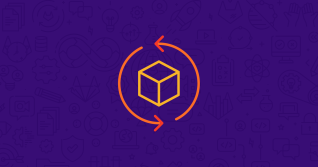Source code acts as a single source of truth and a collection of a product’s knowledge, history, and solutions. Version control serves as a safety net to protect the source code from irreparable harm, giving the development team the freedom to experiment without fear of causing damage or creating code conflicts. If developers code concurrently and create incompatible changes, version control identifies the problem areas so that team members can quickly revert changes to a previous version, compare changes, or identify who committed the problem code through the revision history.
With version control systems, a software team can solve an issue before progressing further into a project. Through code reviews, software teams can analyze earlier versions to understand how a solution evolved. With source code as a starting point to GitLab being a single source of truth, the capabilities expand beyond version control systems that does everything from project planning and source code management, to CI/CD, monitoring, and security.
GitLab enables portfolio planning and management through epics, groups (programs) iterations and milestones to organize and track progress. Regardless of your methodology from Waterfall to DevOps, GitLab’s simple and flexible approach to planning meets the needs of small teams to large enterprises. GitLab helps teams organize, plan, align and track project work to ensure teams are working on the right things at the right time and maintain end to end visibility and traceability of issues throughout the delivery lifecycle from idea to production.
GitLab helps teams design, develop and securely manage code and project data from a single distributed version control system to enable rapid iteration and delivery of business value. GitLab repositories provide a scalable, single source of truth for collaborating on projects and code which enables teams to be productive without disrupting their workflows.
GitLab helps delivery teams fully embrace continuous integration to automate the builds, integration and verification of their code. GitLab’s industry leading CI capabilities enables automated testing, Static Analysis Security Testing, Dynamic Analysis Security testing and code quality analysis to provide fast feedback to developers and testers about the quality of their code. With pipelines that enable concurrent testing and parallel execution, teams quickly get insight about every commit, allowing them to deliver higher quality code faster.
GitLab enables teams to package their applications and dependencies, manage containers, and build artifacts with ease. The private, secure container registry and artifact repositories are built-in and preconfigured out-of-the box to work seamlessly with GitLab source code management and CI/CD pipelines. Ensure DevOps acceleration with automated software pipelines that flow freely without interruption
GitLab allows for security practices to be enabled at the creation phases of the project, increasing resilience to external attacks, internal threats and ability to resume activity promptly. GitLab incorporates several security capabilities to make development more secure even before build happens. They can detect secrets and license compliance issues, find vulnerabilities in source code or in its dependencies before merging, find vulnerabilities in running apps before merging, as well as containers. These capabilities can even reproduce what thousand of users input in seconds to detect faults and other issues with Fuzz testing.
With zero-touch Continuous Delivery (CD) built right into the pipeline, deployments can be automated to multiple environments like staging and production, and the system just knows what to do without being told - even for more advanced patterns like canary deployments. With feature flags, built-in auditing/traceability, on-demand environments, and GitLab pages for static content delivery, you'll be able to deliver faster and with more confidence than ever before.
GitLab helps teams to configure and manage their application environments. Strong integration to Kubernetes reduces the effort needed to define and configure the infrastructure required to support your application. Protect access to key infrastructure configuration details such as passwords and login information by using ‘secret variables’ to limit access to only authorized users and processes. GitLab looks to provide feedback that decreases the frequency and severity of incidents and improves operational and product performance.
Source code management is more than simply tracking changes, versions, and branches of code. The ability to connect every phase of the Software Development Lifecycle in one single DevOps platform via one data layer, one design system, one set of commands to manage all the different stages of software design, development, build and deployment gives an organization a resource like no other.
Watch this short video (3 minutes) to learn how VC&C Single App on GitLab.
Cover image by Markus Spiske on Unsplash



